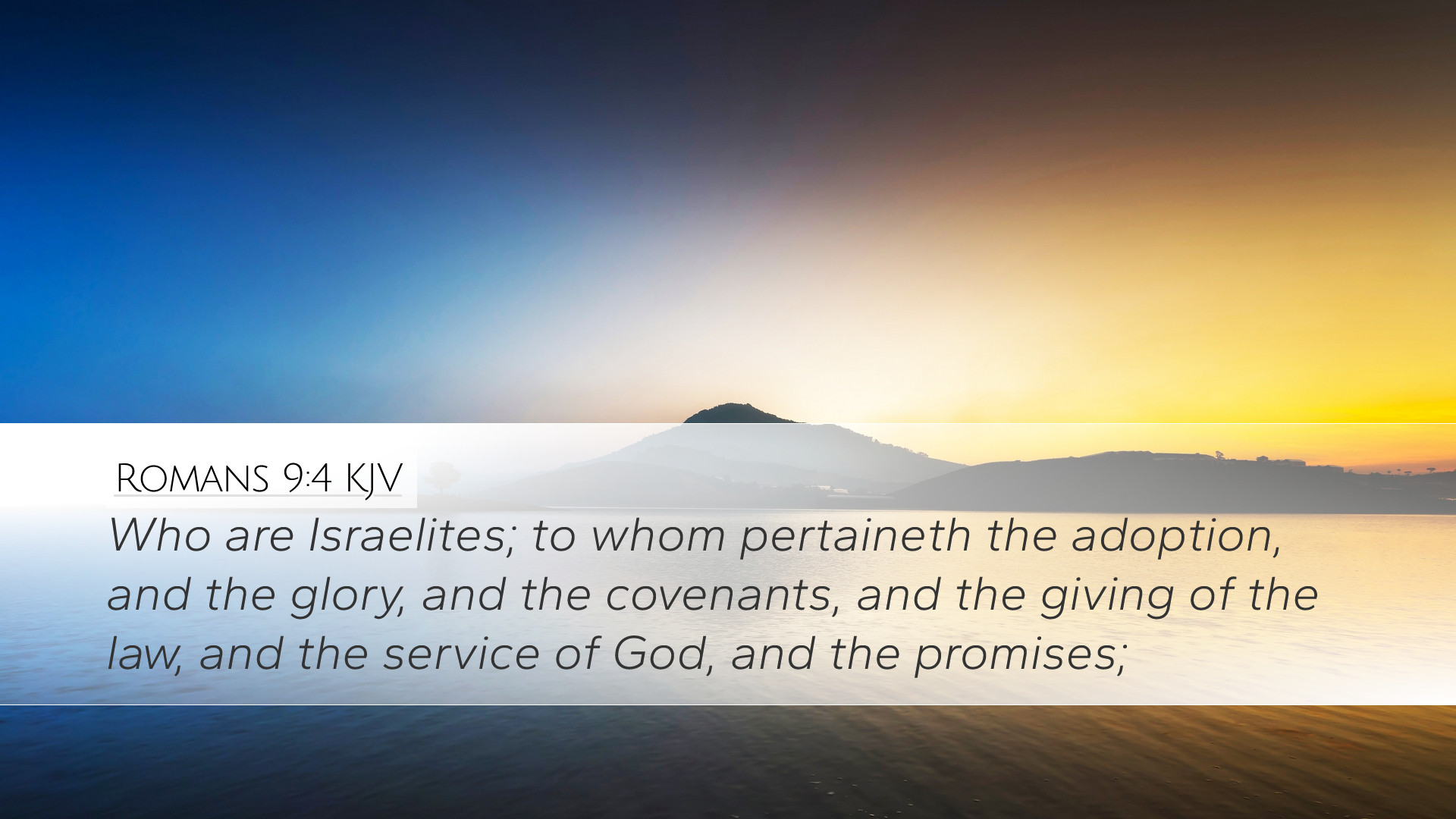Commentary on Romans 9:4
Romans 9:4 states: "Who are Israelites; to whom pertaineth the adoption, and the glory, and the covenants, and the giving of the law, and the service of God, and the promises." This verse expresses the privileges and heritage of the Israelites in the context of God's covenantal relationship with His people.
Contextual Background
Paul, in his epistle to the Romans, seeks to elucidate the implications of the Gospel, particularly concerning the Jewish people. Chapters 9-11 are crucial, as they contemplate God's sovereignty in choosing Israel and the mysteries of divine election.
Insights from Commentaries
Matthew Henry's Commentary
Matthew Henry emphasizes the blessed state of the Israelites, noting that they are not merely a people by ethnicity but are distinguished by divine adoption. He comments on several aspects of their privileges:
- Adoption: The Israelites are God's chosen people, adopted into His family, which renders them unique among the nations.
- Glory: The manifestation of God's glory among them, especially during the Exodus and in the temple worship, is a hallmark blessing.
- Covenants: This refers to the Abrahamic, Mosaic, and Davidic covenants, which highlight the special relationship and promises made by God to them.
- Giving of the Law: The Israelites received God's laws, which serve as a guide for living in harmony with His will, marking them as a morally distinctive people.
- Service of God: Their priestly role and practices within the tabernacle and temple worship are central to their identity.
- Promises: Paul refers here to both material and spiritual promises, culminating in the Messiah, who is the fulfillment of these promises.
Albert Barnes' Commentary
Barnes expounds on the significance of each privilege mentioned by Paul. He articulates that these elements are not merely historical but remain essential in understanding God's redemptive plan:
- Historical Perspective: The historical context of Israel’s election serves to remind believers of God's faithful nature throughout generations.
- Theological Implications: The very nature of God's dealings with Israel reflects His character—faithfulness, mercy, and justice.
- Universal Relevance: While Paul underscores the Jewish heritage, Barnes points out that these attributes serve not just the Israelites but extend their significance to all believers, emphasizing God's universal plan of salvation.
Adam Clarke's Commentary
Clarke delves deeper into the language used by Paul, suggesting that the privileges of Israel denote a serious responsibility as well. He notes:
- Responsibility of Knowledge: With great privileges comes great responsibility. The Israelites were expected to bear witness to God’s character through their laws and blessings.
- Presence of God: The concept of 'glory' also implies the Shekinah presence of God that was manifested among His people, revealing His nature and holiness.
- Transition to the Gentiles: Clarke highlights that while the advantages of Israel are substantial, the coming of Christ signifies a new era where Gentiles are grafted into the blessings initially bestowed upon the Jews. This dual inheritance reveals God's expansive grace.
Theological Themes
In Romans 9:4, several theological themes emerge:
- Covenant Theology: Understanding that God's promises are fulfilled in Christ and extend to both Jews and Gentiles underscores the characteristics of God as faithful and just.
- Sovereignty and Election: The sovereignty of God in choosing His people is key in Paul's discussion, showing He is not arbitrary but purposeful in His divine dealings.
- Redemptive History: This verse serves as a reminder that redemptive history is rooted in particular events and relationships—specifically, those connected to Israel.
- Universal Salvation: The blessings afforded to Israel point toward a more comprehensive vision of salvation that welcomes all nations to partake in God's grace.
Application for Believers
For pastors, students, theologians, and scholars, Romans 9:4 provides rich material for understanding the depth of God's covenant love:
- Appreciation of God’s Grace: Recognizing the privileges of Israel invites believers to reflect on the immense grace given through Christ.
- Responsibility of Witnessing: Just as the Israelites were called to reflect God's glory, believers today are called to live in a way that honors this divine calling.
- Encouragement in Sovereignty: Trusting in God's sovereign plan can provide comfort, especially in times of uncertainty or doubt regarding His promises.
- Inclusivity of the Gospel: Understanding the transition from Israel to the inclusion of Gentiles emphasizes the universal reach of the Gospel, encouraging outreach across cultural lines.
Conclusion
Romans 9:4 encapsulates the intimate relationship God has with His people and highlights the significance of their covenantal privileges. Through a combination of insights from Matthew Henry, Albert Barnes, and Adam Clarke, one finds that this verse not only recounts historical facts but also serves as a pivotal point for theological reflection and application in the life of the Church today. Believers are called to cherish their heritage while actively participating in God's ongoing redemptive work in the world.


